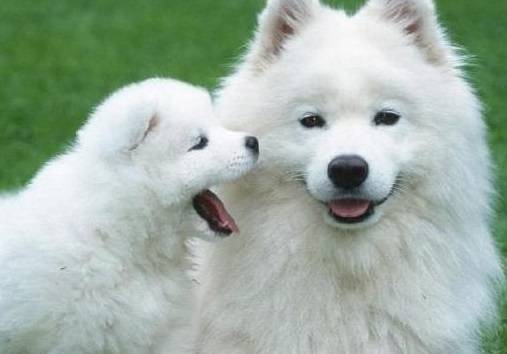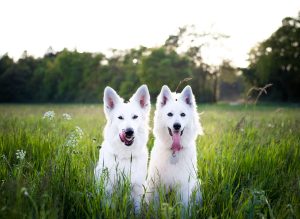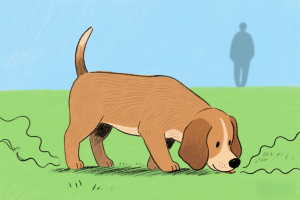When one dog barks, many others respond—why do dogs start barking as soon as they hear their fellow canines?Our little furry friend, woken up yet again by a symphony of dog barks, started seriously pondering this question…Why do dogs howl in response when they hear other dogs barking or even a loud whistle?The “woof-woof-woof” sound is a language unique to dogs, serving to convey information and express emotions.Many attentive dog owners may have noticed that when their dog is quietly resting at home and suddenly hears another dog barking outside, their ears perk up immediately, and they start barking too—sometimes even howling loudly.Even outdoors, dogs often start barking if they hear other dogs in the distance. Occasionally, they may even respond to loud car horns, joining in with their own barks.So, what explains these seemingly universal behaviors? Let’s follow our little furry friend and dig into the secrets behind canine communication!
-
Why Do Dogs Respond Instantly?
According to existing biological research, dogs have been domesticated for over ten thousand years. While it is not definitively proven that they were directly domesticated from wolves, dogs are indeed relatives of wolves.Wolves use howling to convey various types of information. Their howls serve a practical and clear purpose, as wolf packs need to cooperate when hunting. When pack members are far apart, howling helps them stay in contact and coordinate to find their next meal.In fact, wolves have highly sensitive hearing systems that allow them to distinguish between the voices of different pack members. Domesticated dogs have retained this instinct to a remarkable degree and possess excellent auditory abilities.For example, dogs can use vocalizations to identify one another, and they can even distinguish the meaning behind each individual dog’s bark.A 2009 study published in Behavioral Processes showed that dogs can differentiate whether another dog’s bark is saying:“Hey, watch out, a stranger is here!”or “My owner has left me alone again, and I’m unhappy.”So, in general, the reasons why dogs respond to distant barks of other dogs can be categorized as follows:Social convention: Barking is an important form of social communication in dogs, with different barks expressing different emotions or meanings.Territorial declaration: Dogs may bark to assert or protect their territory, especially when a stranger dog approaches or enters their space.Greeting: Barking can also serve as a way to announce their presence: “Hey, I’m here—woof woof woof!” Outdoors, this may even gather friends for play.

-
Why Are Dogs Sensitive to Car Horns?
Many dogs also howl in response to car horns or ambulance sirens. Why is that?It’s well known that dogs have excellent hearing, which differs slightly from the skill mentioned above. Previously, we discussed their ability to understand and respond to other dogs’ vocalizations. Here, the focus is on their ability to detect sounds outside the human hearing range.Studies show that dogs’ hearing is highly developed and far exceeds humans, with a frequency range of approximately 15–50,000 Hz (varying by breed). This is why dogs often wait at the door before you even enter the house, and why they can perk up their ears and detect sounds that humans cannot, even in the dead of night.Moreover, dogs are extremely sensitive to high-frequency, high-decibel sounds. Many horns or sirens are sharp and loud, which dogs may perceive as a threat, prompting them to howl as a warning until the sound stops or the vehicle moves away.
-
How to Handle Excessive Howling
Barking is a dog’s way of communicating, and appropriate barking is necessary.However, some dogs may howl excessively due to excitement or fear, which can negatively impact their own health and disturb family members or neighbors. In such cases, owners need to train their dogs to reduce unnecessary howling.1. Redirect attention:When a dog begins howling, ignore it and move away. Once the dog stops, have them sit and reward them with a treat. Avoid any interaction or reward while the dog is howling.2. Teach “quiet”:Punishing or yelling at a dog may make the behavior worse, as the dog could interpret it as joining in the barking. Instead, calmly teach your dog to “quiet” the way you would teach “sit,” and give generous rewards when the dog succeeds.3. Exercise and walks:Take your dog outdoors to provide a sense of fulfillment. If you cannot accompany your dog, make sure they are well-fed and entertained with engaging toys. A mentally stimulated dog is less likely to bark excessively.Mask external barking triggers:If your dog howls in response to other dogs barking, try playing music to cover the external sounds, helping to calm them down.
It’s important to note that certain dog breeds are more sensitive to the barks of other dogs and high-pitched sounds, so they may bark more frequently. Breeds like shepherds and hunting dogs fall into this category, meaning their owners need to exercise extra patience.After reading this, dog owners probably have a better understanding of why their dogs respond to other dogs’ barks or car horns.If you pay close attention, you’ll likely discover even more amusing behaviors and quirks in your furry companions!





